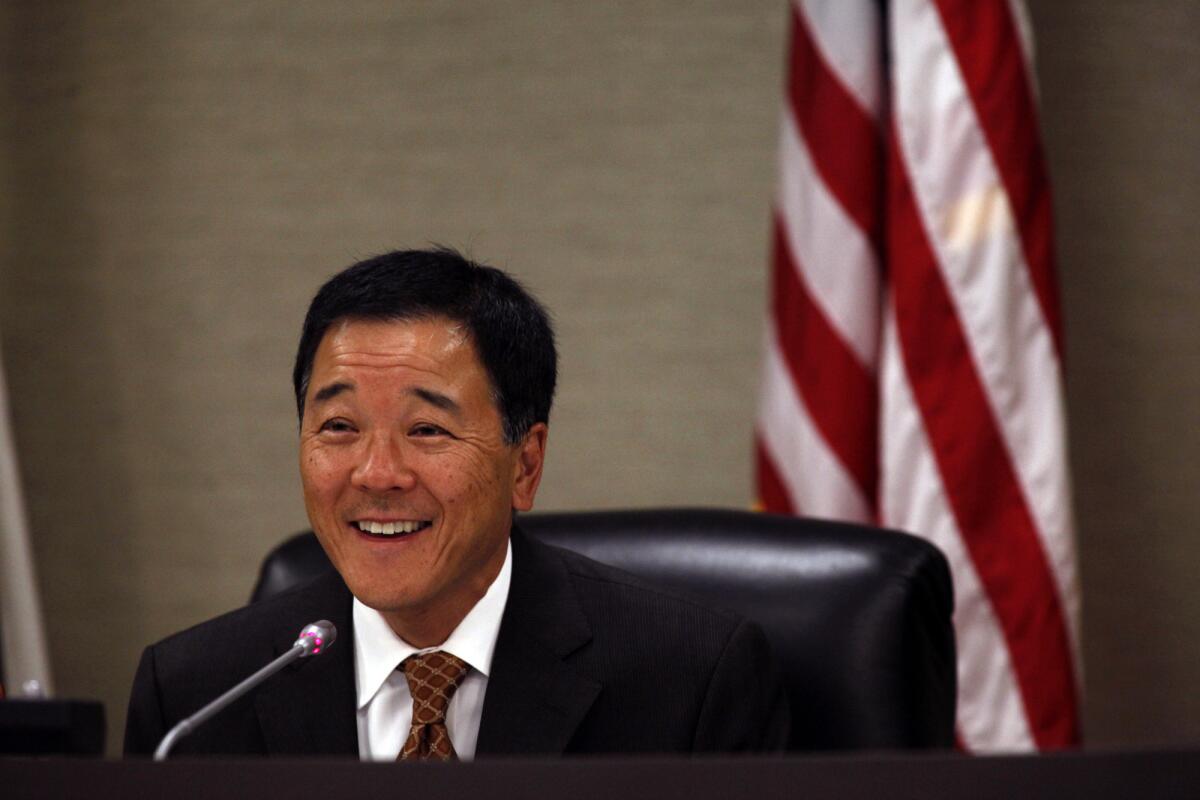After Baca’s guilty plea, L.A. jail corruption case turns toward trial of his top aide, Paul Tanaka

Paul Tanaka, mayor of Gardena, is seen in 2014. The former Los Angeles County undersheriff is facing trial in federal court on charges of obstruction of justice and conspiracy.
The criminal trial of Paul Tanaka, a once powerful figure in Los Angeles policing, is set to open with the former undersheriff facing charges he deliberately thwarted an FBI investigation into jail abuses.
Tanaka, who served as the second in command to former L.A. County Sheriff Lee Baca, is charged with conspiracy and obstruction of justice for the role prosecutors say he played in a scheme to conceal the whereabouts of an inmate who was working as a federal informant and intimidate an FBI agent.
The trial is the latest, and likely the last, in a series of high-profile prosecutions stemming from 2011, when sheriff’s officials discovered and objected angrily to a secret FBI probe into the jails. In all, nine members of the department have been convicted or pleaded guilty.
Last month, Baca himself joined the disgraced group when he admitted to lying to FBI agents and prosecutors investigating the beatings of inmates and visitors at the nation’s largest jail system. As part of a plea deal he struck, Baca, who left office two years ago, will avoid being indicted on more serious charges and can be sentenced to no more than six months in prison.
Tanaka, who serves as mayor of Gardena, faces far longer behind bars if he is convicted, but he has steadfastly maintained his innocence.
On Wednesday, the two sides entered U.S. District Judge Percy Anderson’s downtown courtroom and began selecting jurors. Always an arduous process, picking the panel was particularly difficult as many prospective jurors said they could not commit to the trial, which is expected to last three or four weeks.
Jury selection was scheduled to continue Thursday.
In the lead up to trial, prosecutors from the U.S. Attorney’s Public Corruption and Civil Rights Section have portrayed Tanaka in court filings as a malicious leader who, for years, “largely ignored” explicit warnings of abusive deputies beating inmates and “rebuffed and rebuked whistleblowers.”
“Given this background, it sadly is not surprising that, after learning of a federal grand jury investigation into excessive use of force and public corruption in the [Sheriff’s Department], Tanaka closed ranks and conspired to obstruct the investigation,” Brandon Fox, the lead prosecutor in the case, wrote in one filing.
An attorney for Tanaka, H. Dean Steward, called the charges “baseless” when the indictment was announced last year. At trial, Steward and his partner, Jerome Haig, are expected to present Tanaka as a convenient scapegoat who was uninvolved in any efforts to interfere with the FBI.
The allegations against Tanaka, 57, center largely on Anthony Brown, a convicted felon who began working as an FBI informant while he was serving time in the county’s main jail facility.
Prosecutors accuse Tanaka of playing a leading role in orchestrating a plan to keep FBI agents from speaking with Brown after sheriff’s officials discovered he was an informant in August 2011.
The indictment alleges that Tanaka gave jail staff an order forbidding agents from seeing Brown and says “a furious Tanaka” berated several underlings when agents were allowed to see their informant.
And, in late August 2011, deputies approached clerks working in the sheriff’s records center and said they were acting on orders from Tanaka, according to the indictment. They instructed the clerks to falsify entries in the agency’s database to show Brown had been released from custody when, in fact, he remained in a jail cell, the indictment alleged. The episode, prosecutors contend, was part of a broader scheme in which the deputies repeatedly moved Brown among various jail facilities under fake names to conceal his whereabouts from federal authorities.
During testimony at a deputy’s obstruction trial, Tanaka said that he did not have a clear memory of many events but that Brown was moved under false names for his own safety and to make sure the Sheriff’s Department could properly investigate a cellphone FBI agents smuggled into Brown.
Prosecutors also accuse Tanaka of having a hand in the decision to send two sheriff’s deputies to confront Leah Marx, the lead FBI agent in the case, at her home and question her about the cellphone.
Marx refused to speak, and one of the deputies threatened her with arrest. According to the indictment, when the agent’s supervisor called to inquire about the impending arrest, one of the deputies told him, “You’re going to have to talk to the undersheriff.“
Until he retired in 2013, Tanaka was a polarizing figure in the Sheriff’s Department. While he enjoyed support from a loyal segment of the force, he ultimately came to be seen as someone who carved out a powerful fiefdom beneath Baca that he ran with impunity.
A blue-ribbon panel that investigated the jails and found widespread problems of abuse faulted Baca for allowing his undersheriff to run the jails without effective oversight.
Tanaka, they found, “failed to uphold the department’s goals and values.”
Find me on Twitter: @joelrubin
More to Read
Sign up for Essential California
The most important California stories and recommendations in your inbox every morning.
You may occasionally receive promotional content from the Los Angeles Times.











